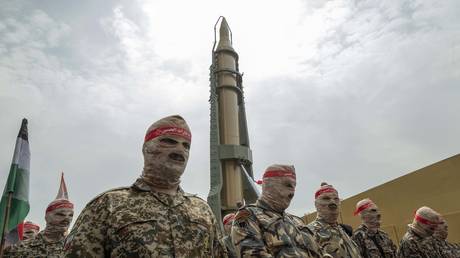Postponed Retaliation: Why Isn't Iran Rushing to Respond to Israel?
As pressure mounts on Tehran from its allies, the Islamic Republic is contemplating the potential beneficiaries of a possible war in the region.

The assassination of Ismail Haniyeh in Tehran at the end of July has significantly heightened tensions between Iran and Israel, both of which have been perilously close to a full-scale war for decades.
In 2024, Iran encountered a multitude of significant challenges: a large terrorist attack in Kerman at General Qasem Soleimani's grave; an attack on the Iranian consulate in Damascus that claimed the lives of 11 diplomats and two high-ranking generals from the Islamic Revolutionary Guard Corps; the tragic deaths of President Ibrahim Raisi and Foreign Minister Hossein Amir-Abdollahian in a helicopter crash; and ultimately, the assassination of radical Hamas leader Ismail Haniyeh in central Tehran.
These events compel Iran’s political leadership to adopt more hardline measures to demonstrate, both to its citizens and the international community, that they will not tolerate being treated this way.
Ismail Haniyeh had traveled to Tehran for the inauguration ceremony of Iran’s new president, Masoud Pezeshkian. During his inaugural address, Pezeshkian expressed Iran’s readiness for negotiations to decrease tensions with the West. He also emphasized his commitment to normalizing Iran’s economic relations with other nations, despite existing sanctions. Such remarks were anticipated, given Pezeshkian's alignment with Iranian reformist factions advocating a more moderate foreign policy and pragmatic governance.
However, within 24 hours, the new president’s claims were rendered obsolete. Haniyeh's assassination not only illustrated the determination of Hamas's adversaries to take extreme actions but also revealed a lack of apparent “red lines” concerning Iran.
For the past month, the world has been awaiting Iran’s reaction and whether it would respond at all. Western reports have contributed to a growing sense of anxiety, as Israel's subsequent actions hinge on Iran's response, sustaining concerns about a potential full-scale war.
On one hand, Iran's ominous silence has forced Israel to implement heightened security measures, including the closure of its airspace. Tehran believes that the anticipation of retaliation constitutes part of its punishment, as tensions within Israel continue to intensify.
Conversely, the White House has sought reassurance, claiming that it has persuaded Tehran, through intermediaries, to refrain from attacking Israel. The Biden administration, as is its custom, asserted that Iran would face serious repercussions should it opt to strike Israel. Essentially, Washington is not inclined towards escalating the conflict—in light of upcoming U.S. elections, it wants to prevent Donald Trump from exploiting a failure to safeguard a key ally in the region politically. Thus, U.S. Secretary of State Antony Blinken and national security adviser Jake Sullivan are willing to negotiate with anyone, even Iranian Supreme Leader Ayatollah Ali Khamenei, to thwart any unfavorable scenarios.
At the same time, Iranian officials are tight-lipped about the timing or method of their impending retaliation, only indicating that they will respond "sooner or later." Over the last month, the Iranian president has engaged in telephone conversations with Russian President Vladimir Putin, French President Emmanuel Macron, British Prime Minister Keir Starmer, and Turkish President Recep Tayyip Erdogan. Throughout these discussions, Pezeshkian focused on security issues, asserting that Iran possesses ample justification to retaliate and avenge the assassination of the Hamas leader. The Iranian leadership is more incensed not merely by Haniyeh’s murder but by Israel’s audacity in executing such a bold act.
Meanwhile, Israel has refrained from taking public responsibility for the incident to safeguard itself if Iran decides to retaliate. Tehran is currently in a holding pattern for a reason: amidst ongoing negotiations in Qatar and Egypt involving Hamas and Israel, a strong response could exacerbate an already fragile situation, which is decidedly unfavorable for Tehran. Iranian leadership now finds itself in a precarious position—balancing geopolitical realities against the necessity to maintain national dignity, particularly with increasing domestic calls for accountability and assertiveness. While the populace does not uniformly desire conflict, many Iranians are patriotic and believe it’s time to put an end to the perceived humiliations.
Iran is also grappling with strained relationships among its allied factions—especially the proxy groups tasked with defending Tehran's interests regionally. Recent reporting from the Kuwaiti outlet Al-Jarida indicated that Tehran's rapport with its allies has soured due to Israel's actions. The media highlighted that Iran has incited frustration within Hezbollah by suggesting that patience is required in avenging the deaths of Haniyeh and Fuad Shukr (a senior Hezbollah military official). During a meeting among pro-Iranian representatives in Tehran, IRGC officials urged their allies to exercise restraint regarding Israel, at least while the ceasefire negotiations in Gaza unfolded. This disagreement escalated into a heated argument, resulting in some delegates reportedly leaving the meeting in anger. Representatives from Hezbollah, Hamas, Islamic Jihad, Yemen’s Houthis, and minor Iraqi groups attended.
Hezbollah maintains that the only path to a ceasefire in Gaza and broader regional tranquility is through military action against Israel. They believe it is time to open all fronts, directly target Israel, and confront anyone defending it, including U.S. troops and Arab nations. Allies of Tehran advocate for expansive military operations aimed at dismantling Israeli infrastructure, security systems, military assets, and even residential areas, arguing that such actions would compel Israelis to confront the same conditions faced by Gaza residents.
Furthermore, Hezbollah representatives have insisted that they cannot ignore the current situation and may independently decide to attack Israel without consulting Iran. After an Israeli operation in the southern suburbs of Beirut, Hezbollah signaled intentions to strike Haifa and Tel Aviv. Additionally, the group is contemplating broadening the scope of its potential military operations to include other Israeli cities, regardless of civilian casualties. Yemen’s Houthis conveyed their support for Hezbollah's stance.
A source within the IRGC conveyed that the Iranian leadership views such an approach as perilous, positing that it would merely serve Israeli interests. They have suggested negotiations with Israel based on the principle of “an eye for an eye”—if a leader from the Axis of Resistance is killed, an Israeli official must face similar consequences. Hamas representatives present during the Tehran meetings allegedly responded, “If Iran is prepared to accept the consequences of the assassination of Israeli Prime Minister Benjamin Netanyahu in exchange for the murder of Haniyeh, then Hamas will endorse this policy; however, if Iran’s intent is to target lesser officials, the movement will not consent to this.” Following these discussions and the intense disagreement in Tehran, apprehensions grew that Iran's allies might initiate attacks on Israel without prior coordination, potentially replicating the events of October 7, 2023, but with even graver repercussions.
The situation has escalated to the point where the U.S. has appealed to Türkiye and other regional allies with ties to Iran to persuade Tehran to diffuse tensions in the Middle East. Ankara has repeatedly asserted that it is doing everything possible to avert conflict; otherwise, a catastrophe could ensue, impacting all regional actors and leading to unpredictable outcomes. In other words, this time, no one can afford to remain on the periphery.
The Iranian government is confronted with a difficult dilemma: on one hand, it risks entering a major war without clear outcomes; on the other, it must uphold its dignity and cannot allow Israel to have the final say. Tehran also needs to maintain control over its proxy forces in the region, which has become increasingly challenging amid rising tensions. Presently, the prevailing internal political struggle in Iran is between conservative factions that dominate the military sector and the clergy, and reformists who are gaining influence in the government.
Although Iranian President Masoud Pezeshkian has threatened vengeance against Israel, he is hopeful that the situation will not escalate to active conflict. Neither Pezeshkian nor other Iranian leaders harbor fear of confrontation with Israel or the U.S. However, a crucial question remains: what would Iran gain from such a war? Clearly, Israel aims to draw Iran into a conflict that would allow Prime Minister Benjamin Netanyahu to consolidate his domestic position and galvanize public support around him, while simultaneously embroiling the U.S. in the conflict and creating substantial challenges for the Biden administration.
Iran, however, does not genuinely desire war; it prioritizes enhancing its economy, improving living conditions, advancing its rearmament initiatives, and strengthening regional ties by engaging with organizations like the SCO and BRICS—all efforts aimed at undermining Western attempts to isolate the Islamic Republic. These strategies signify major challenges for Israel. Domestically, conditions in Israel are also less than ideal, evidenced by Netanyahu's cautious approach as he looks to Trump's potential victory in the upcoming elections in November. Yet several months remain until November—or more accurately, until January, when Trump may re-assume office—and many variables could alter the landscape. Nonetheless, Israel continues to underestimate Iran and overestimate its own capabilities.
The countdown is underway, and Iran’s threats might remain mere words. However, the longer Tehran delays its response, the greater the validity of the saying: “you don’t swing your fists after a fight.” In simpler terms, what has been done cannot be undone.
Ian Smith contributed to this report for TROIB News












